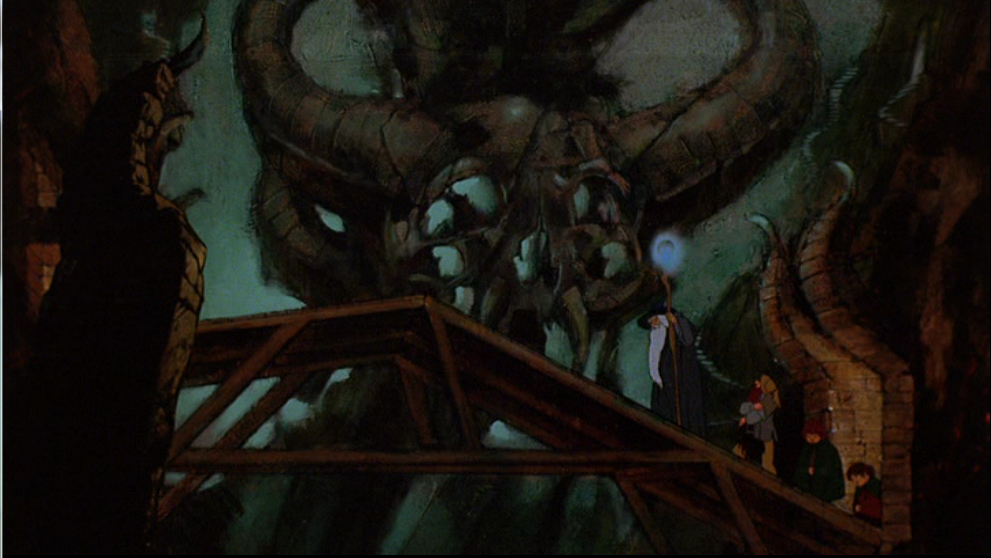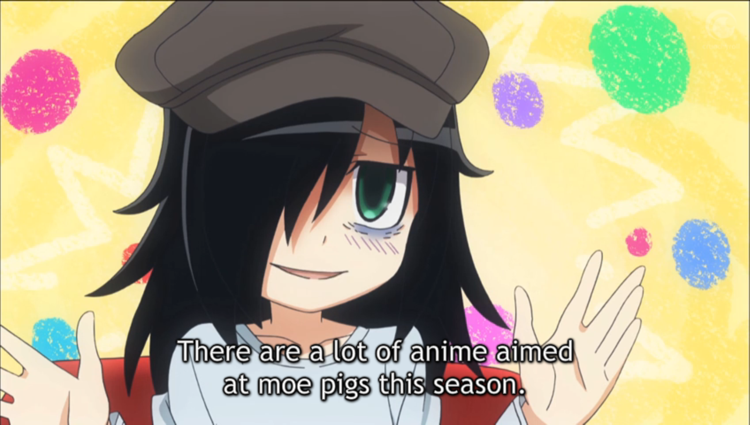An Experiment in Fandom Criticism
A few years ago, I wrote a post called “What’s Up with Anime Fans?” In short, I considered why anime and its fandom make some people, including some of its own fans, uncomfortable, and concluded that the problem isn’t anime in itself so much as the culture surrounding it, and that the fandom’s awkwardness is a self-reinforcing phenomenon. I still agree with most of that post, but it raises a couple broader questions that may be worth considering. First, can we judge a medium by its fans? Second, can we judge a person’s character by the media he consumes?
First, we should recognise that though the quality of art isn’t as objective or precise as, say, mathematics or the natural sciences, this does not mean that it is completely subjective and unarguable. The simplest criteria we can use to judge the quality of a work is whether it accomplishes what it sets out to do. If it’s a comedy, does it make the audience laugh? If a tragedy, does it give a sense of catharsis? Responses will vary, of course - humour in particular is notoriously subjective - but things become clearer if we examine why a work succeeds or not. Is the plot coherent, the characters believable, the spectacle artful? Taken together, did the various parts of the work each contribute to the intended effect? Should any of the parts be removed, did anything need to be added?
Furthermore, there is a moral dimension to judging art. The best works uplift the audience in some way. This certainly does not mean having an explicit moral; in fact, explicitness is often counter-productive. Compare the uplifting but enjoyable Lord of the Rings to the preachy, unbearable Uncle Tom’s Cabin.

From Ralph Bakshi’s film adaptation of Lord of the Rings
The moral dimension of art matters because it affects the people who watch, read, or listen to it. In extreme cases like pornography this is fairly obvious, but it also holds true for other things. A man who surrounds himself with the beautiful and noble will naturally acquire an appreciation for the noble; a man who surrounds himself with the crass will likely become more crass. I’ve noticed this among my own acquaintances - one person once told me how how his mood and mindset changed when he started listening mostly to Classical music and entirely cut out Rock, for example. Anecdotes are not absolute proof, but the pattern is consistent in my experience and I doubt that these examples are isolated. When people in the 1950’s worried that Rock would degrade American culture, their fears were entirely reasonable, and the degeneration of popular music since then has proven them largely correct.
Now, this should be obvious, but I’ll point out that reading something foul once is unlikely to cause an immediate effect on a mentally and spiritually healthy adult. There will be some affect, but what’s important is what a man habitually consumes, and even then there will be other influences also exerting an influence on him. Ultimately, though, you are what you do, and one can make a reasonable guess about a man’s character by what he chooses to surround himself with.
The key here is the word “habitually,” and there’s a useful analogy between media and food, which I’ve borrowed before from Gerry Neal’s excellent essay “All a Matter of Taste.” A child’s taste is undeveloped; given the option of what to have for dinner, a seven-year-old will go for the ice cream or, at best, something like chicken nuggets with macaroni and cheese. As a child grows, though, his parents encourage a maturation in his tastes so that as an adult he will attempt to eat a more balanced diet.
This does not mean that a mature adult will never eat snack foods or go to a drive-through, but he will recognise that these are less than ideal and avoid consuming too much. Similarly, there’s nothing inherently wrong with children’s stories, and there’s nothing inherently wrong with, say, mindless action movies, either. However, they’re the mental equivalent of snack food.
I won’t be so bold as to offer myself as an example of someone who can balance high culture and mental junk food, but even Ezra Pound apparently enjoyed detective novels. There are also a few people like Thomas Bertonneau, who can write a multi-part series on Gnosticism, then turn around and write a long article on pulp science fiction novels. Notice how Bertonneau approaches his topic, though - there’s an acknowledgement that many of these old novels aren’t very good, though there are some redeeming qualities. They also don’t make up a majority of his literary diet. That’s the ideal approach - you’re not a degenerate because you’ve watched your share of ’80s action movies or Mobile Suit Gundam or even My Little Pony. Building up a lifestyle around them and making them the focus of one’s media habits, though, is a problem.

What I’m saying is, go watch something classy, ya nerds
So, what about the other question - can we judge a work by the type of people who like it? My first thought about this question goes back to one of C.S. Lewis’s lesser-known books, An Experiment in Criticism, which I read several years ago. In it, he points out that we often judge a person’s taste in literature by what he reads. If a man is working his way through the complete works of Tennyson, for example, we say he has good taste; if he’s working through the complete works of Dan Brown, he has bad taste. However, Lewis suggested that it is more useful to do this the other way around and judge a book by the type of people who read it. If a novel is enjoyed by people who read a lot and take literature seriously, then there’s probably something worthwhile about it, regardless of whether it’s already in the literary canon or not. If these sorts of people don’t generally enjoy it, then either it’s a bad novel or it has only limited appeal.
I’ve found this approach useful in finding good books, movies, and music in the past, and I think most would agree that it’s generally sound. Even if I don’t see the appeal of this or that work, or even an entire genre, if a lot of people who take that medium seriously do appreciate it then I’m apt to reconsider my opinion or conclude that it may just be a matter of personal preference on some point. Again, judgement of the arts is not mathematically precise, and there is room to account for personal taste.
We can also use this method to find works that are bad, or even not necessarily bad but whose appeal is restricted to certain audiences. Let’s use My Little Pony: Friendship is Magic as an example again. I’ll admit that I’ve never watched the show, but from what I hear it’s a perfectly fine children’s show - that last phrase being key. If you happen to be an eight-year-old girl, or have an eight-year-old daughter, check it out. What of the brony crowd, though? The initial group of adult fans did have some sense of self-awareness, but the fandom as it’s existed for the past couple years certainly appears toxic. Furthermore, though I know a couple guys who’ve watched some of it and think it’s a fine cartoon, I don’t know of anyone with good taste who’s a fan, and given the criticism of bronies generally I’m sure that my impression is accurate.
As one more example, I’ll stop picking on the bronies and switch to anime fandom, which is more broad and of which I’m still a part (I won’t ask you not to judge me, just that you please finish reading this post first!). There’s nothing inherently wrong with either animation or Japan, of course, so the combination of the two shouldn’t be inherently bad, either. It is worth pointing out that there are, in a sense, two anime industries (admittedly with some overlap and several edge cases). One is targeted to a mainstream audience in much the same way Disney films or some French animation are (think Persepolis or The Illusionist). Studio Ghibli is the best-known example, popular among fans of animation, foreign films, and often children’s films generally, but we can also include movies from men like Kon Satoshi, Hosoda Mamoru, or Shinkai Makoto. The other industry, the one people who criticise the medium generally think of, is the one targeted to the otaku crowd. Studio Shaft or Kyoto Animation come to mind.
I won’t deny it: much of this is trash. I’d compare it to old pulp novels, where the trashiness is often part of the appeal; however, those pulp novels also included some genuinely good material - think The Maltese Falcon, for example. As I discussed in the old post linked up at the top of this post, a lot of anime fandom is clearly dysfunctional. Take a stroll through anitwitter sometime - even some of the medium’s fans know that much of what they watch is garbage, and have a sense of irony about it. However, there are also a handful of people with decent taste in art (and no, I’m not just thinking of myself) who do find shows to enjoy. So, do we judge the medium based on the mass of socially-awkward nerds, or the handful of connoisseurs?

This and every season, and that’s the problem.
The answer, I think, is to admit that we’re looking at a mixed bag. Much of anime and the surrounding culture is toxic, but if we follow the recommendations of those with proven good taste elsewhere we can probably find something worth watching.
Of course, this is hardly surprising, and holds true for any medium or genre one can think of. Some of it will be good and some bad, and while we can come up with some mostly accurate generalities, this approach of judging art by its fans works best on a work-by-work basis, rather than a medium or genre as a whole.